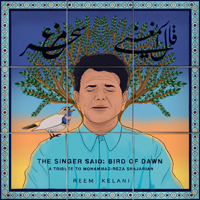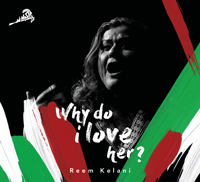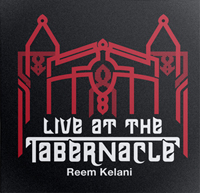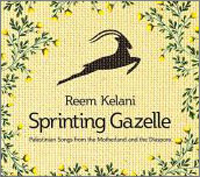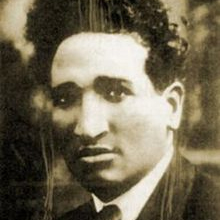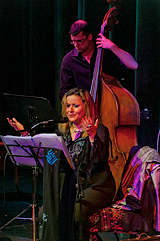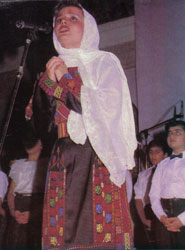Features
Reem Kelani: The music and the memory
The UK-based Palestinian singer discusses how her music is part of a struggle for Palestinian identity.Article by Abubakr al-Shamahi
al-Araby, 5 November 2014
Click here
Reem Kelani: Singer and Musician
'I realised that my vocation was to present the Palestinian narrative through music to a world which struggles to admit that we even exist, let alone that we might have a distinctive and beautiful cultural identity.'The Middle East in London, February - March 2014
Click here to read.
Songs of separation: First Lady of the furaaqiyyaat
Acclaimed Palestinian singer, Reem Kelani, talks to Palestine News about her life and work.Article by Hilary Wise
Palestine News, January 2013
Click here to go to the original article.
Reem Kelani's journey from occupied territories to occupied Tahrir
Palestinian singer Reem Kelani indulges herself in research on iconic Egyptian music legend, Sayyid Darwish.Article by Ati Metwaly
Ahram Online, 23 February 2012
Click here
The Art of War
Reem Kelani: 'You can burn a book, you can burn a piece of antique furniture, but our music, our songs, our poetry, you canít burn; it travels, it goes everywhere'.Article by Clare Wiley
International Arts Manager, November 2011
Click here to go to the original article.
My Name is Reem Kelani - In The Long Now
I was born in Manchester, of Palestinian, Arab, Muslim parents. This is my story in the Long Now.My mother hails from Nazareth in the Galilee and my father from Jenin in the West Bank. I spent my formative years in Kuwait and I moved back to the UK 20 years ago.
I see myself not as a victim, for victims can become oppressors. I have my Palestinian cultural DNA, and as an artist, I want to share it with you. There are people who seek to suppress my narrative, while others are afraid to acknowledge it.
My debut solo album took 20 years to produce, encompassing my arrangements of old songs I collected from Palestinian mamas in Palestine and in the refugee camps in the region, as well as my own compositions. It wasn't an easy journey, but as an independent unsigned artist, I take pride in bringing my cultural heritage to you.
I just want you to acknowledge my existence as a Palestinian and our rights as Palestinians. You may not like my music, but you cannot ignore the collective cultural heritage of my people.
I had the privilege earlier this year to attend a talk given by Archbishop Tutu, in which he spoke about the struggle against Apartheid and of how the Church of England had sustained and supported him and his colleagues in South Africa through solidarity in their hour of need. Similarly, the Church of Denmark responded to the threat of Nazism and did so much to ensure the safety of their Jewish fellow citizens.
May Palestinians, and Palestinian Christians among us, not have to wait any longer for Christians in Europe to take up their struggle for basic justice. After all, St George, your patron saint, was a Palestinian!
Greenbelt, August 2009
What's on Syria
On the eve of Reem Kelani's appearance at Jableh Cultural Festival, she talks to Joanne Lisinska about her past, to find out how she identifies with her music, her people and her motherland
Published July 2009
Click here
'My narrative is that I exist'
Natalie Hanman talks to the Manchester-born Palestinian singer and jazz musician about her eclectic influences and connecting with her roots
Published in the Guardian, 19 September 2008
Click here to go to the original article
Because I'm an Arab, I play Jazz
Interview with Reem Kelani
by Mira Katbamna
Published in the British Council's New Routes - issue 7 - 2007
I am a Muslim but I am primarily a Palestinian
Reem Kelani
by John Lewis
Published in Gulf Air's inflight magazine, October 2007
Reem Kelani and the Beating Wing Orchestra
Interview with Reem Kelani
by Sarah Irving
Published in the Big Issue in the North, September 2007 [PDF]
'Land and freedom'
Reem Kelani tells Mira Katbamna about the refugees who taught her to sing
Published in the Guardian, 1 November 2006
Click here to go to the original article
Fancy cutting your own CD?
Singer Reem Kelani became an entrepreneur to make sure her music was heard.
Sally McCrone hears about her struggle to record a DIY album
Published in the Observer, 26 February 2006
Click here to go to the original article
Existing Music
Reem Kelani has a very individual take on Palestinian music. Jamie Renton finds out what makes her tick
Published in fRoots, April 2005
Click here to go to the original article[PDF]
Roots
An obituary of Dr Shawkat Kelani
Published in The Guardian newspaper, 2002
An interview with Reem Kelani
Jayne Comins' Firing Line: Reem Kelani
Published in The Singer magazine, August / September 2001
Songs of Pain and Pride
Burj el-Barajneh Dispatch
written by Reem Kelani
Published in The Middle East Report, spring 1999 [PDF]
Politics second to music for Kelani
Singer Reem Kelani is not affiliated with any political association or movement, but she can't help who she is.
"It's true - the fact that I exist, that I am here, makes me political. You can't be a Palestinian without being political", Kelani said recently.
Yet she won't talk politics in concert. Instead, she tell stories and jokes and takes time to explain the meaning of her songs to non-Arab audiences.
Though Kelani, 31, was born in Manchester, England, and earned a degree in zoology there, she has lived most of her life in Kuwait. She left Kuwait and returned to England nine months before the outbreak of the Gulf War.
Last year, for the first time, Kelani gave concerts in Palestinian camps and the Israeli-occupied territories.
"There were mixed feelings. I was happy. I was appalled. I was sad. I was elated. I was depressed. I was manic", she admitted. "We are 2.5 million Palestinians who live outside Palestine and it is difficult. You don't have the day-to-day danger of living under occupation, but you have nostalgia and estrangement".
On tour, Kelani expresses her nostalgia through the choice of her material and her musical gestures of blues and jazz. Whenever possible, she lives to draw cultural parallels too, and will happily sing an Irish ditty for an Irish crowd or an a capella version of Amazing Grace for an audience in Scotland. Concerts will often include a Gershwin or Berlin standard.
For tonight's performance at Place des Arts, however, Kelani will concentrate mostly on her Palestinian folkloric repertoire. She will accompany herself on acoustic guitar and wooden flute, joined by a derbakkeh drummer and a second musician on the lute-like oud.
When asked whether Kelani expects to live in Palestine one day, she hesitated.
"That's a tough question. We have an old Arab saying: 'When there isn't what you want, want what there is.'"
By Daniel Feist
Montreal Gazette, Canada, 19 March 1994

